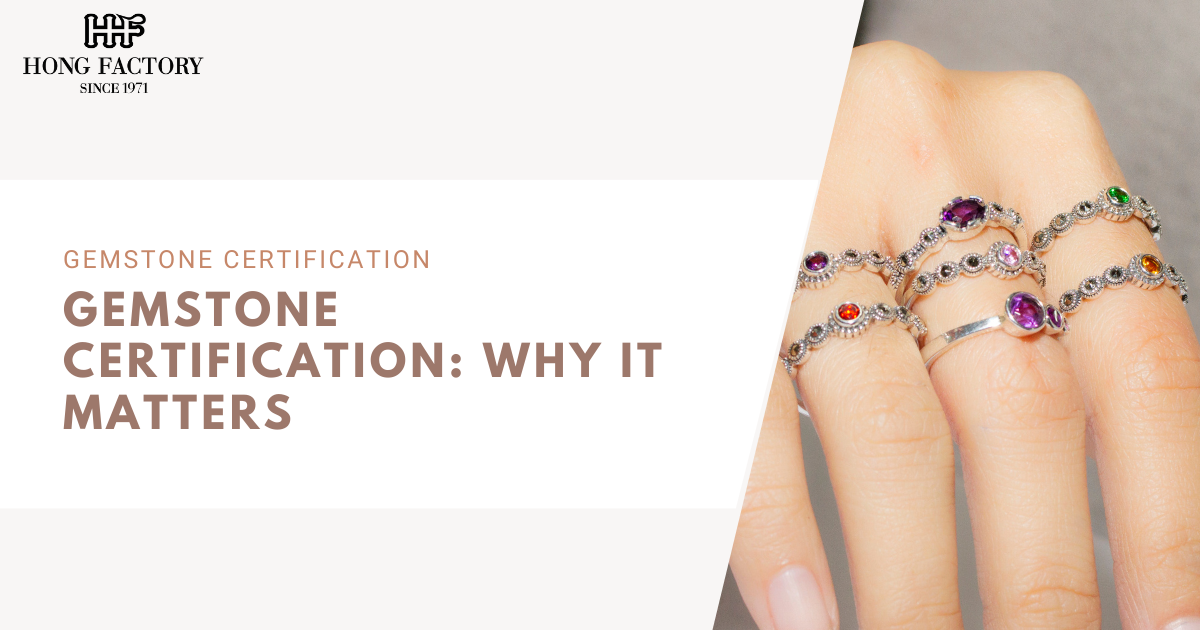Gemstone Certification: Why It Matters

Purchasing gemstones is an investment, whether for personal jewelry, collections, or financial purposes. However, with the abundance of synthetic, treated, and imitation stones in the market, verifying a gemstone’s authenticity and quality is crucial.
This is where gemstone certification plays a vital role.
Certification provides transparency, ensures fair pricing, and gives buyers confidence in their purchases. This article explores the importance of gemstone certification, how it works, and what to look for when buying certified gemstones.
1. What is Gemstone Certification?
Gemstone certification is a formal evaluation conducted by professional gemological laboratories to determine a gemstone’s authenticity, quality, and characteristics. These reports verify factors such as:
- Identity – Natural vs. synthetic gemstone classification.
- Origin – Whether the gemstone comes from a specific geographic location.
- Treatment Disclosure – Whether the gemstone has undergone enhancements such as heat treatment, oiling, or irradiation.does stainless steel turn skin green
- Grading – Assessing attributes like color, clarity, cut, and carat weight.
Certified gemstones come with official documentation detailing these factors, allowing buyers to make informed decisions.

2. Why is Gemstone Certification Important?
a. Ensures Authenticity
- Prevents fraud by distinguishing natural gemstones from synthetic and imitation stones.
- Confirms that a gemstone has not been misrepresented in terms of composition or treatment.
b. Guarantees Fair Pricing
- Certified gemstones are graded based on standardized criteria, ensuring accurate valuation.
- Buyers can compare stones confidently without overpaying for misrepresented gems.
c. Verifies Treatment and Enhancement
- Many gemstones undergo treatments to improve their appearance. Certification discloses whether a gemstone has been heated, filled, dyed, or irradiated.
- Untreated gemstones often command higher prices, making certification crucial for investment-grade stones.
d. Increases Investment Security
- Certified gemstones retain value better and are easier to resell.
- Certification serves as proof of quality for insurance and appraisal purposes.

3. Top Gemological Laboratories for Certification
Several internationally recognized institutions provide gemstone certification:
a. Gemological Institute of America (GIA)
- One of the most respected gem labs worldwide.
- Provides reports on diamonds, colored gemstones, and pearls.
- Known for stringent grading standards and unbiased analysis.
b. American Gem Society (AGS)
- Specializes in diamond grading and ethical gemstone practices.
- Offers detailed reports on cut quality and light performance.
c. International Gemological Institute (IGI)
- Well-regarded for grading diamonds and colored gemstones.
- Offers quick turnaround times and global accessibility.
d. Swiss Gemological Institute (SSEF)
- Specializes in high-value colored gemstones and origin reports.
- Trusted for evaluating rubies, sapphires, and emeralds.
e. Hoge Raad voor Diamant (HRD Antwerp)
- Based in Belgium, known for diamond grading expertise.
- Provides certification for both loose gemstones and jewelry.

4. Understanding a Gemstone Certification Report
A gemstone certificate contains several key pieces of information:
- Gemstone Type – Identifies whether the stone is a diamond, sapphire, ruby, emerald, etc.
- Weight (Carat) – Measures the gemstone’s size.
- Dimensions – Provides exact measurements for shape and proportion.
- Color and Clarity Grade – Evaluates the purity and vibrancy of the stone.
- Cut Grade – Assesses how well the gemstone has been cut for optimal brilliance.
- Fluorescence – Indicates if the gemstone emits light under UV exposure.
- Treatments – Notes any enhancements or artificial modifications.
- Origin (if applicable) – Some reports include geographic origin, especially for valuable stones like rubies, emeralds, and sapphires.

5. How to Verify a Gemstone Certificate
a. Check the Lab’s Reputation
- Only trust reports from reputable gemological institutions.
- Avoid unknown or unverified certification providers.
b. Verify the Report Online
- Many gemological labs allow you to verify certification through their websites using a report number.
- Cross-check details to ensure consistency with the gemstone in question.
c. Compare Certification with Physical Inspection
- Ensure the gemstone’s attributes match the certificate description.
- Use a jeweler’s loupe or professional appraisal to validate details like inclusions and color.

6. The Risks of Buying Non-Certified Gemstones
a. Risk of Overpaying
- Without certification, gemstones may be overpriced based on false claims.
b. Unknown Treatments or Synthetic Origins
- Sellers may pass off synthetic or treated stones as natural gems without disclosure.
c. Difficult Resale or Insurance Process
- Uncertified gemstones may lack proof of authenticity, reducing resale value and complicating insurance claims.
7. Certified vs. Non-Certified Gemstones: Cost Considerations
Certified gemstones often have a slightly higher price due to the cost of laboratory testing. However, the long-term benefits outweigh the initial investment:
- Certified Stones: Higher resale value, proven authenticity, transparency in grading.
- Non-Certified Stones: May be cheaper upfront but come with greater risk of misrepresentation.
8. Certification for Different Types of Gemstones
While diamonds are most commonly certified, other gemstones also benefit from certification:
- Rubies & Sapphires – Color and origin significantly impact value.
- Emeralds – Certifications disclose oiling treatments and clarity enhancements.
- Tanzanite & Tourmaline – Rare gems often come with certification for authenticity and origin.
- Pearls – Certificates indicate whether pearls are natural, cultured, or imitation.

Gemstone certification is an essential tool for buyers, collectors, and investors. It ensures authenticity, fair pricing, and transparency in treatments and origin. By purchasing certified gemstones from reputable laboratories, buyers can confidently invest in high-quality stones that retain long-term value. Whether for personal jewelry or investment, certified gemstones offer security, credibility, and peace of mind.
Keywords: gemstone certification, certified gemstones, GIA certification, gemstone authenticity, diamond grading, gemstone value, buying gemstones




